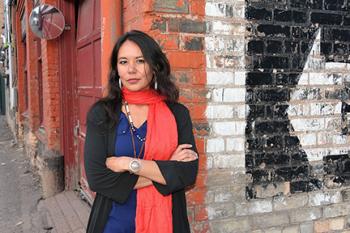Image Caption
Summary
A new Canada Research Chair to probe enhancement of Indigenous health and well-being is one of three CRCs to be established at the University of Saskatchewan.
Dr. Michelle Johnson-Jennings (PhD), Canada Research Chair in Indigenous Community-Engaged Research, was recruited from the University of Minnesota. She is one of the few Indigenous psychologists focused on healing interventions on the land.
Johnson-Jennings, a Choctaw Nation Enrolled Tribal Member, will investigate whether Indigenous groups heal more swiftly and experience longer-lasting change if health interventions are made on the land, reconnecting communities to ancestral teachings.
The associate professor in Indigenous studies will engage Indigenous communities around food and land-based healing practices that reduce addiction and obesity risks and promote well-being.
Research has found that being on the land affects the brain positively and produces more life-long behavioural changes.
By engaging Indigenous communities in Canada, the U.S. and New Zealand, Johnson-Jennings will develop a global approach to land-based healing.
Another of the new Chairs will carry out air quality in cold climates research, and the other Chair will research preventing cyberattacks.
Three existing USask CRCs at USask have been renewed. One conducts research into bacterial resistance, another the electronic structure of novel materials, and the third studies economic development barriers facing northern, remote and Indigenous communities.
Dr. Ken Coates (PhD), Canada Research Chair in Regional Innovation, in the Johnson Shoyama Graduate School of Public Policy, identifies barriers preventing rural and remote communities from reaping the benefits of scientific and technological innovation enjoyed in more metropolitan areas. For instance, the Internet in the Canadian North is five to 10 years behind the south.
Working with Indigenous groups, northern and rural communities, business groups, and provincial and federal governments, Coates examines innovation-based investment, skills training and entrepreneurship in non-metropolitan areas, looking at best practices in other countries that can be applied in Canada. He is co-ordinating international efforts to encourage the use of new technologies in northern, remote and Indigenous communities.
“These prestigious awards underscore USask’s place as a centre of research excellence and our commitment to a diverse and inclusive research community,” said USask Vice-President Research Karen Chad.
The CRC program was created by the Government of Canada in 2000 to attract and retain some of the world’s most accomplished and promising minds and to boost Canada's competitiveness in the global knowledge-based economy.
USask currently has 19 active CRCs in a wide range of disciplines.

